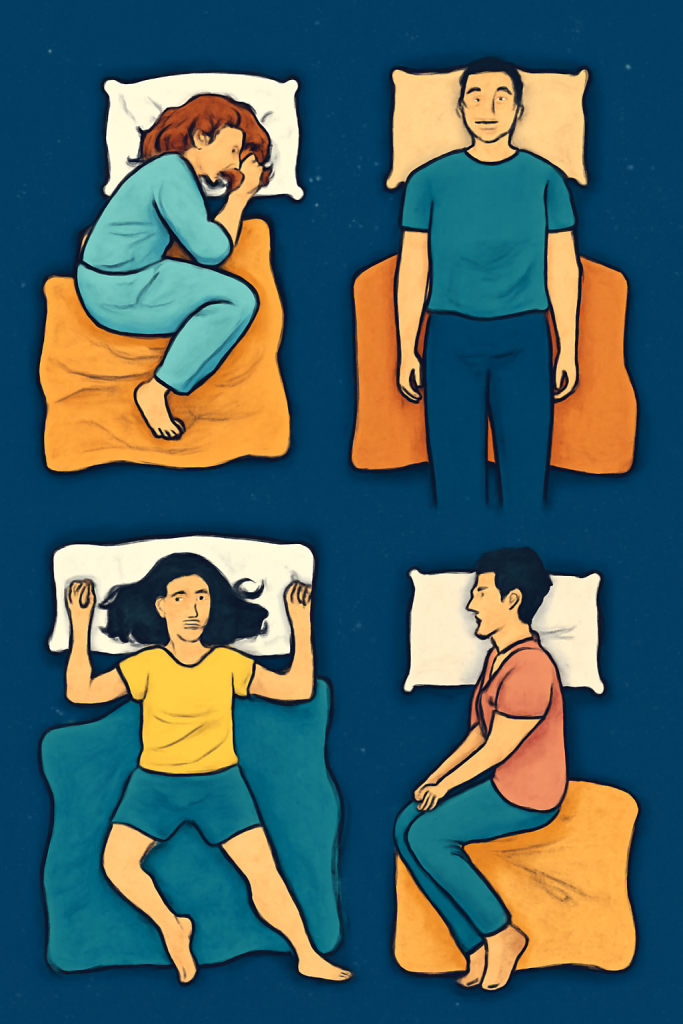Sleep is an essential part of life, but have you ever wondered what your preferred sleeping position might reveal about your personality and well-being? In recent years, the concept of “sleep style” has gained attention in both scientific and popular literature. Understanding what your sleep style says about you can offer valuable insights into your emotional state, physical health, and even interpersonal relationships.
This article explores the connection between sleep positions and personality traits, backed by current research and expert opinions. We will cover common sleep styles, their psychological implications, and practical tips for improving your sleep quality based on your natural tendencies.

Why Sleep Style Matters
Sleep styles vary widely and include common positions such as the fetal position, starfish, soldier, and more. These patterns aren’t random. Research suggests that how you sleep correlates with your emotional state, personality traits, and even certain health conditions.
Understanding your sleep style can help you optimize your rest and identify potential issues early. As sleep science advances, knowing these links becomes more important—not just for comfort but for overall well-being.
Popular Sleep Styles and What They Reveal
1. The Fetal Position: Sensitive but Strong
Curling up in a tight ball is the most common sleep style globally. People who prefer this position tend to be sensitive and may appear tough on the outside but are often shy and protective inside. This style is linked to a need for comfort and safety.
Emerging research from the National Sleep Foundation notes that fetal sleepers are often deep sleepers, but curling too tightly might restrict breathing or cause joint stiffness (National Sleep Foundation 2023).
2. The Soldier: Calm, Reserved, and Methodical
Sleeping on your back with arms at your sides, the soldier position reflects a person who is quiet, reserved, and disciplined. They prefer structure and have high standards but tend to suppress emotions to maintain control.
This position is considered excellent for spinal health but can exacerbate snoring and sleep apnea in some individuals (American Academy of Sleep Medicine 2022).
3. The Starfish: Friendly and Generous
Starfish sleepers lie on their back with arms up near the head. These individuals are often good listeners, supportive, and prefer helping others. However, this position can lead to snoring and may not be ideal for those prone to sleep apnea.
A 2023 study highlights that starfish sleepers might benefit from specialized pillows to reduce discomfort and improve airflow (Sleep Health Journal 2023).
4. The Log: Easygoing and Social
Sleeping on one side with arms down, log sleepers are typically sociable, easygoing, and trusting. They value harmony and are generally open-minded.
This is considered one of the healthiest sleep positions for reducing acid reflux and improving digestion (Mayo Clinic 2023).
Emerging Trends: Sleep Style and Mental Health
Recent studies reveal that sleep style can be an indicator of mental health status. For example, people who shift positions frequently during the night might be experiencing anxiety or stress, while those who stick to one position are more likely to feel emotionally stable.
Technology trends show a rise in sleep tracking devices that monitor these movements, helping users gain insights into their emotional well-being through sleep data. This has led to personalized sleep coaching apps that recommend optimal sleep styles and habits tailored to mental health needs.
How Sleep Style Affects Physical Health
Your sleep style is not only a reflection of personality but also a significant factor in physical health:
- Spinal Alignment: Sleeping on your back or side with proper support helps maintain spinal health.
- Breathing and Snoring: Certain positions like back sleeping may worsen snoring or sleep apnea, affecting oxygen intake.
- Circulation: Sleeping positions can influence blood flow, especially for pregnant women or those with circulatory issues.
Adjusting your sleep style can improve sleep quality and reduce risks associated with poor posture during sleep.
Tips to Optimize Your Sleep Based on Your Style
- Fetal Position: Try loosening the curl and use supportive pillows for knees to improve breathing and joint comfort.
- Soldier Position: Use pillows to slightly elevate your head to reduce snoring risk.
- Starfish Position: Consider pillows under knees to relieve lower back pressure.
- Log Position: Ensure your mattress and pillow provide enough support to maintain spinal alignment.
What Your Sleep Style Says About You: Summary
Your sleep style offers a unique glimpse into your personality and health. Whether you’re a sensitive fetal sleeper or a disciplined soldier, understanding these patterns can lead to better sleep hygiene, improved health, and even emotional insight. Keep an eye on emerging tech and research that continue to deepen our understanding of sleep’s role in everyday life.
References
- National Sleep Foundation (2023) Sleep Positions and Their Meaning. Available at: https://www.sleepfoundation.org/articles/what-your-sleep-position-says-about-you (Accessed: 18 May 2025).
- American Academy of Sleep Medicine (2022) Sleep Position and Health. Available at: https://aasm.org/sleep-position-health/ (Accessed: 18 May 2025).
- Sleep Health Journal (2023) ‘Effects of Sleep Position on Snoring and Sleep Quality’, Sleep Health, 9(2), pp. 123-130. https://doi.org/10.1016/j.sleh.2023.01.005 (Accessed: 18 May 2025).
- Mayo Clinic (2023) Healthy Sleep Positions. Available at: https://www.mayoclinic.org/healthy-sleep-positions (Accessed: 18 May 2025).









